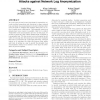469 search results - page 5 / 94 » On Adversary Models and Compositional Security |
CCS
2011
ACM
12 years 7 months ago
2011
ACM
We introduce a novel model of routing security that incorporates the ordinarily overlooked variations in trust that users have for different parts of the network. We focus on ano...
CRYPTO
2004
Springer
14 years 1 months ago
2004
Springer
We construct two efficient Identity Based Encryption (IBE) systems that are selective identity secure without the random oracle model. Selective identity secure IBE is a slightly w...
SAC
2009
ACM
14 years 8 days ago
2009
ACM
In recent years, it has become important for researchers, security incident responders and educators to share network logs, and many log anonymization tools and techniques have be...
CCS
2009
ACM
14 years 8 months ago
2009
ACM
In this paper, we re-visit the problem of unconditionally secure message transmission (USMT) from a sender S to a receiver R, who are part of a distributed synchronous network, mo...
EUROCRYPT
2008
Springer
13 years 9 months ago
2008
Springer
Recently, Aumann and Lindell introduced a new realistic security model for secure computation, namely, security against covert adversaries. The main motivation was to obtain secure...

